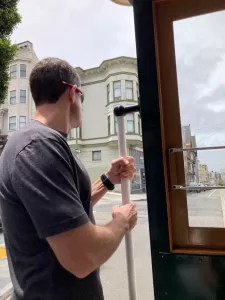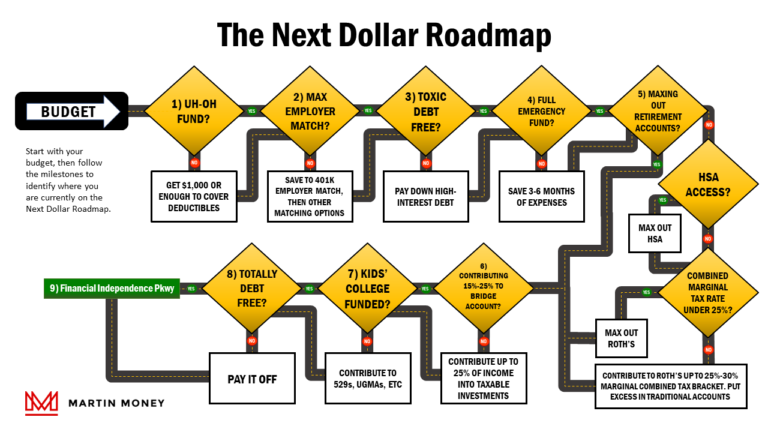Start With Why
Understanding the emotions that drive our behaviors and personal financial philosophies is an important step in producing a better likelihood of monetary success in life. It could be argued that knowing your “why” is as important as establishing other financial habits like budgeting and saving.
In 2009, Simon Sinek wrote a book titled, Start With Why: How Great Leaders Inspire Everyone to Take Action.
In the book, Sinek illustrates how organizations that begin their strategic planning by identifying their “why?” experience much greater success than those that lead with “what?” or “how?”.
"People don’t buy what you do, they buy why you do it."
Simon Sinek
No, this isn’t a business strategy or career inspiration website, but the principle is just as applicable in our personal lives; including how we approach our finances.
Understanding your primary motives for building wealth is a critical driving force for success.
With all of that said, perhaps we should frame what we mean by your “why?”.
For the purposes of this post, and this website for that matter, we’re defining your “why?” as the deep-seated emotional needs that drive you to set and achieve financial goals.
Start With Why: Moving Beyond “How” and “What”
Since “why?” gets at the root of emotional need, we need to be sure we don’t stop short of identifying it after we’ve found our “how?” or “what?”.
For example, a “what” maybe $2,000 to pay off a debt.
A “how” related to that may be selling personal items, working extra shifts, or using an income tax refund to get your hands on $2,000.
The “why” is related to your emotional need for the debt to be gone. This could be something like debt giving you anxiety or maybe the $2,000 is owed to a close friend and you want to get it out of the way of your relationship.
Our tendency is to focus on the “how” and “what” because those questions provide a plan. They give us a sort of checklist or outline to follow.
For many of us, these easily identifiable tasks are enough to set us on our way.
The problem is having a list of tasks to complete alone lacks the fuel you’ll need in your tank to reach long-standing or complex goals…like becoming wealthy.
By attaching an emotional driver to our journey to become financially independent, we effectively give it an adrenaline boost.
What we were once eager to do, we become determined to do. What once was an exercise is now an enterprise. Where once we had an idea, why gives us inspiration.
Why I Run
I love to run.
There are few things I enjoy more than getting up before sunrise, preferably on a cold Saturday morning, and hammering out anywhere from 12-18 miles in town.
Most people think this is strange. I usually see furrowed brows and curled upper lips when I relate this hobby to others.
However, it’s the truth. I really do love running, but this wasn’t always the case.
I got my first real introduction to distance running on my high school’s soccer team. We’d run 10-15 miles a week in the preseason and I hated it.
About 3 years after Lisa and I got married, we decided we’d do a half-marathon to try and tone up before swimsuit season.
It was the slowest half-marathon I’ve probably ever run and I didn’t really enjoy it (but I loved finishing).
Fast forward another 6 years, and about 30 pounds, and I started running again on my own.
Why? I received a blood lab report that indicated my LDL (bad cholesterol) was high for a 33-year-old.
I suddenly enjoyed running.
My motive wasn’t looking lean or being fast, it was being healthy enough to hang with my kids as they aged or just be alive long enough to see them grow into adults.
I was horrified by the idea of being an out-of-shape dad that sat on the sidelines while his kids did all manner of fun activities without him.
My “why” was a deep emotional desire to not only be alive for my kids, but to be physically capable of doing anything with them they wanted: hiking, biking, running, climbing, fishing, whatever; I was going to be able to do it.
I wanted to experience life with them.
Start with Why Allows Us to Prioritize Competing Goals
As we start looking at other reasons to start with “why?”, let’s start with how it allows us to quickly prioritize existing goals.
We all have a point where another dollar just isn’t worth it.
I’ll give you an example specific to you.
You don’t have three full-time jobs during the week.
Why?
Because you physically can’t keep a pace like that. At some point, you have to rest, live your life, or spend the money from your first two jobs.
In all likelihood, you have only one full-time job. You’re willing to trade 40+ hours a week for that income. That’s the point where another dollar isn’t worth it.
Some of you have a second job or another source of income because it’s worth it for you to trade more time for that money.
What I’m explaining are trade-offs. Life is full of them. I’ll assume you agree and spare you another example, but we want to acknowledge that our financial goals are not exempt.
At some point, your “why?” will be followed by a “which one?”, because sometimes you just can’t have both. There will be a day when something comes up that you willfully back off your financial plan to support.
When our kids were born, Lisa stayed at home for a while instead of working. It slowed financial progress but was absolutely worth it to us.
Last Fall, we went to the Grand Canyon as a family. It was expensive and we could have invested the money instead, but it was worth exchanging the money for the experience.
I can give these examples confident that we made the right decisions because even though we have emotional drivers for pursuing wealth (giving, retirement, travel, kid’s education, etc.) they are secondary to other “why’s?” like faith, family, education, and health.
When you dig down to the “why?” that drives your financial decision-making, you can more easily rank competing priorities when one must give for the sake of the other.
Start with Why gives us focus and motivation
On average, people who become millionaires do so sometime in their late 40s.
Since most people also begin their working career sometime in their early 20s, this is typically a 25+ year journey.
Sadly, by the time many reach millionaire status, it won’t be what it once was. While we still think it’s a goal worth striving for, it is true that one million dollars won’t carry you as far as it once did.
So, if you want more than one million bucks, you’re in for an even longer journey. That’s a lot of time to get distracted, off-track, or just give up.
You can’t walk a road that long without having a focus on the destination.
Identifying your why has a refreshing way of decluttering your focus on the ultimate goal. And the clearer our picture of the goal is, the more motivated we’ll be to achieve it.
Start with Why provides us with boundaries
There are a lot of ways to make a buck, but not all of them are for you.
Going back to the triple-shift worker that doesn’t really exist, there are just places we’re not going to go in order to have more money.
Similarly, there are methods for wealth building that won’t align themselves with your why.
For example, if you were trying to pay off debt because it brings anxiety or is an ethical position you believe in, you probably shouldn’t borrow hundreds of thousands of dollars to leverage real estate in exchange for steady rental income.
It’s not that being a landlord is wrong, it’s just not the path that is consistent with your why.
Knowing that makes it easy to avoid the wrong path and waste your time in endeavors you don’t really believe in.
One of the most common ways I see this is the tradeoff of time with loved ones for the sake of a career.
These are both very important parts of everyone’s life, but odds are your why for working hard in your career is so you can enjoy a better quality of life with your family.
You can’t enjoy life with your family while you’re still at work.
Reminding ourselves of “why” from time to time helps us keep things in their proper place and balance our lives more effectively.
Start with Why Gets Us Back on Track After a Setback
Life happens.
Job losses, health scares, natural disasters; they’ll likely all impact us at some point.
Events like these aren’t just disruptive. They totally change our focus for a while. But, eventually, it’s healthy for us to move back toward our previous normal.
When your financial journey is knocked off track by events like these, your “why” is an ally for establishing your focus again and picking up where you left off.
We’ve shared several times before that Curt lost his job in 2015. Even though our “why” didn’t change, our use of finances sure did.
We halted contributions to savings and shifted to living on the emergency fund we had in place. We were moving backward as long as he remained unemployed.
Eventually, however, he did get another job and we went back to the same motives and plans that we had established prior to his layoff.
Your why can be a sort of compass in this way. Always pointing to true north, you can rely on it to get you back on track when life knocks you down.
Start with Why Guides Behavior After Success
One day we hope you’ll stand triumphantly on the mountain of a life of sacrifice and self-discipline, and reach the goals you aspire for.
When you get there, do everyone else a favor and don’t change.
Money definitely has the ability to change people, and not always for the better.
Understanding your why provides at least some accountability to prevent you from becoming a disingenuous jerk.
As you’ve dreamed about your future success, are there things you’ve thought would be nice to do for others when you get there? Make an agreement with yourself that you’ll follow through on that.
Among my favorite stories are the professional athletes who are the children of single moms who made immense sacrifices for their sake as they were coming of age.
Flush with cash after signing a contract as a professional athlete, many of these young people buy homes or cars for their parents to honor them for their loving provision over the years.
There’s a lot of honor in that. It makes us feel good to hear stories like that because we know some things are bigger than money.
Of course, that’s easier to say when it’s not our money.
If you’re the type of person who spends his or her free time absorbing financial blog posts, you’re probably wired a bit differently than most.
I’ll even say you probably have a better chance of reaching financial independence than most.
If you’re going to be wealthy, be a good wealthy person. Stick to the principles and relationships that got you there and be a generous person.
After all, some things are bigger than money.
What would most wealthy people say their why is?
As I was writing this, I thought it would be interesting to know what the primary “why’s?” are for wealthy people. I didn’t find a study that ranked them, but here is a list of common motivators for wealthy Americans.
- Security
- To get out of poverty
- Freedom and independence
- The opportunity to use money for new things, to invest
- To innovate
- Affluence
- Competition
- Personal confirmation that you got a lot of things right
- The opportunity to meet interesting people
- Social Impact
Interesting stuff. To be honest, I was a little disappointed to see competition and affluence on the list, but there it is.
Those seem like hollow goals to me that would lose their luster over time.
How Do You Find Your Why?
In full disclosure, being emotionally literate is not something I’ve ever been accused of. (This is Curt, by the way.)
For years, I was more likely to resist thinking about or digging into the emotions that were responsible for driving my behavior, especially if I perceived those emotions as negatives or weaknesses.
As I’ve matured a bit, I’ve come to realize how important it is to be emotionally aware of one’s self, for your sake and that of others.
I hope these questions help you hone in our your own “why?”
- When I think about money, I feel…
- What did you associate money with as you were growing up?
- How did your childhood shape your view of money? Work? Giving?
- If you were given one million dollars today and could use it any way you wanted, what would you do with it and why?
- What are you afraid of not having?
- What are you afraid of having too much of?
- Are you generally positive or negative about money?
- What is worth spending money on?
- What is not worth spending money on?
- What five things do you spend most of your money on?
- What five things do you spend most of your time on?
- What future events are you excited about?
- When do you feel most loved?
- What is something I am confident in my ability to do or accomplish?
- What are my weaknesses?
- What am I afraid of?
- During idle time, I tend to think about…
- Describe your life in 5 years. 10 years. 20 years.







